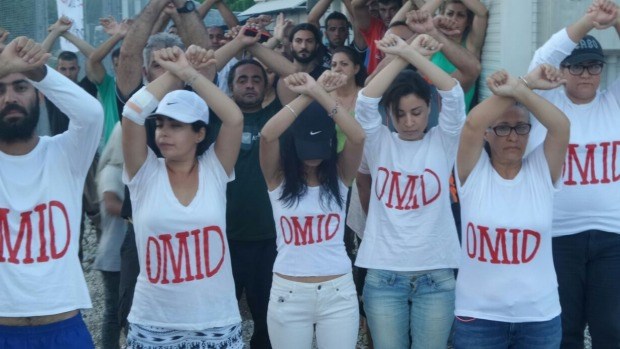
By MICHELLE INNIS
Monday, May 2, 2016
SYDNEY, Australia — A Somali woman set fire to herself on Monday on the tiny Pacific island of Nauru, where Australia sends asylum seekers who try to reach its shores by boat. She is the second refugee within a week to self-immolate.
The woman, 21, who has been identified only as Hodan by refugee activists, sustained critical injuries, the government of Nauru said in a written statement. She was being treated on Nauru by four emergency doctors from Australia and was expected to be moved to an Australian hospital.
On Wednesday, an Iranian refugee identified in Australian news reports as Omid Masoumali, 23, set himself on fire. Mr. Masoumali died in a Brisbane hospital on Friday. His wife, Nana Masoumali, told Barri Phatarfod, an Australian doctor with Doctors for Refugees, that her husband had been without critical medical care for two hours and that he had not been airlifted from Nauru for 24 hours.
Mr. Masoumali was protesting the conditions on Nauru and his plight.
The Australian government refuses to allow asylum seekers to come to Australia to be processed if they arrive by boat or are intercepted at sea. Even those determined to be refugees are not allowed to settle in Australia. They are resettled on Nauru, or in Papua New Guinea, where Australia has another offshore processing center on Manus Island, or in third countries like Cambodia.
Australia’s immigration minister, Peter Dutton, has refused an offer from the government of New Zealand to allow refugees to resettle there.
The policy is meant to deter asylum seekers from paying people smugglers to ferry them from Indonesia and into Australian waters, often on unseaworthy boats.
But human rights activists say that the policy is harsh. Stopping rickety boats setting off for Australia may prevent drownings, but it often pushes refugees back into war zones or into dire situations fighting with extremists, Kenneth Roth, the Human Rights Watch executive director, said in Sydney last week.
In its statement, the government of Nauru said it was distressed “that refugees are attempting such dreadful acts in order to attempt to influence the Australia government’s immigration polices.”
Sally Thompson, a spokeswoman for the Refugee Rights Action Network in Western Australia, said Hodan had been treated in a Brisbane hospital for a head injury she sustained on Nauru. But last Wednesday, she was taken back to the island against her will.
“Hodan’s friend called me to tell me Hodan had set herself alight, and she was in the hospital, and she was in a very bad way,” Ms. Thompson said. “There happened to be a specialist medical team on Nauru, which is unusual, and we hope she is getting better care than Omid.”
Dr. Phatarfod, from Doctors for Refugees, said she had been told that Hodan had severe burns, perhaps to as much as 70 percent of her body.
Elaine Pearson, from Human Rights Watch in Sydney, said conditions at Nauru and Manus Island are grim.
“Self-harm on Nauru isn’t new,” Ms. Pearson said. “Every week, asylum seekers in detention on Nauru have been self-harming by cutting themselves, swallowing razor blades, poison, or trying to hang themselves with sheets.”
Ian Rintoul, from the Refugee Action Coalition in Sydney, said that Sunday marked 43 days of protests on Nauru, where men, women and children were pictured holding signs saying, “God please help us.”
Ms. Pearson said Australia’s Department of Immigration and Border Protection had a log that showed 188 episodes of self-harm among asylum seekers held on Nauru in 12 months.
“So the question is: Why has the Australian government been so slow to act and address the cause of this severe level of depression and despair faced by the refugees?” she said in a telephone interview.
“The Australian government can’t just sit on its hands while people are setting themselves on fire,” she said. “Sending asylum seekers to Nauru and Manus was supposedly about saving lives at sea, but now those very people are trying to kill themselves on land.”
Last week, Papua New Guinea’s high court declared that the detention center on Manus Island was unconstitutional. Prime Minister Peter O’Neill said his government would meet with officials from Australia this week to determine what lies ahead for the more than 800 men held on the island.
Mr. Dutton, the Australian immigration minister, ruled out moving them to Australia. Mr. Dutton’s office did not return phone calls requesting an interview on Monday night.
About 1,100 asylum seekers or refugees are held on Nauru, including almost 470 who have remained within the camp’s grounds. The camp gates were opened last year, allowing refugees to live in the community.
“Opening the gates of the camp doesn’t resolve the fundamental harm done to people who are left languishing on a tiny island indefinitely,” said Daniel Webb, of the Human Rights Law Center in Australia.
Follow Michelle Innis on Twitter @MichelleInnis.